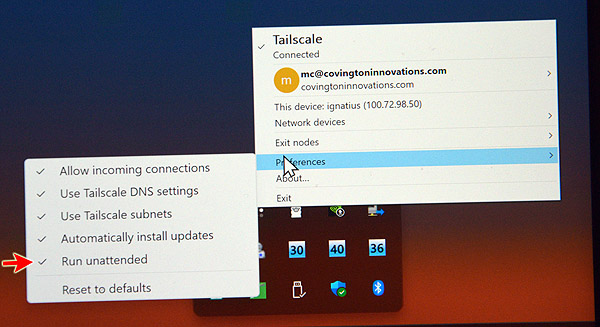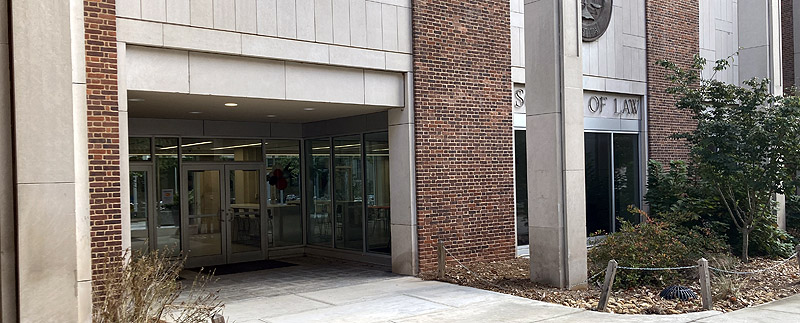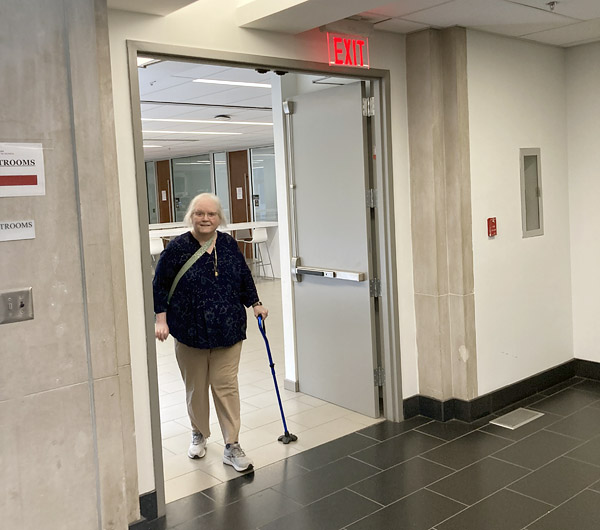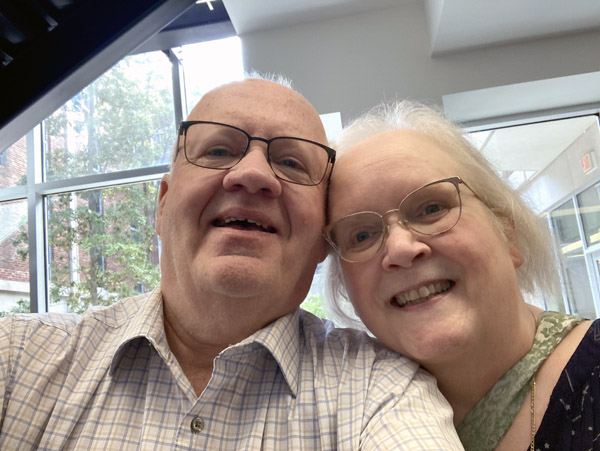2025
November
30
|
Beware of AI quacks
On LinkedIn, and elsewhere, I see 3 kinds of people writing about AI:
(1) (least common) Those with considerable AI experience and broad knowledge;
(2) (more common) Those with a lot of money staked on making it come out their way, or at least keeping people panicked;
(3) (now very common) Those who have been in AI for maybe 6 months, think they know everything, and want to pontificate (a lot like the loud self-appointed experts we heard from during COVID).
Until recently, hype from people of type (2) was the biggest problem.
Now they seem to be outnumbered by type (3), the arrogant ignorant.
Today one of them declared that AI was going to produce "99% unemployment."
For no reason, just the way people declared things about COVID for no reason.
Permanent link to this entry


|
2025
November
27
|
Thanksgiving
In a couple of hours we're going to head off for Thanksgiving dinner with
Melody's aunt and uncle (and whole extended family) in suburban Atlanta.
This year, we have a lot to be thankful for:
- Thanks to cararact surgery, I have the best eyesight I've had in many years
(although it will be better yet when a posterior capsular opacification is cleared
next spring).
- I'm also mostly rid of a long-standing pesky digestive problem,
thanks to having discovered several foods I'm sensitive to and should not eat.
(Unfortunately, one of them is pizza. How can I continue to be a computer professional
and not eat their characteristic food?)
- Melody hasn't had major health problems or accidents for quite a while.
- Sharon is making slow but steady progress against the nerve damage that has
been her nemesis for years.
- The grandchildren are prospering.
Covington Innovations is having a slow time because a major project has scaled down and I have
not yet picked up others. (So if you want to do something innovative with software,
whether or not you call it AI, look at my capabilities.)
But the slow time itself has some advantages; I've gotten 3 books written and published!
Here's hoping you, too, have things to be thankful for and are looking forward
to happy holidays and a prosperous new year.
Permanent link to this entry
The Fish Head Nebula, IC 1795
On Monday night, Nov. 23, I got out under the stars again, at least in my driveway, and took
three good pictures. Here you see the Fish Head Nebula, which is actually part of a complex
called the Heart Nebula, but framed as it is in my picture, it really does look like the
head of a fish. This is ionized hydrogen gas in interstellar space, glowing red.
|
| |
What you see is a stack of 94 30-second exposures taken with my Celestron 8 EdgeHD,
f/7 reducer, and Altair 26C astrocamera, on my Losmandy GM811G mount.
Why 94? Because, actually, I was having very bad tracking, due to unsteady air and also
a polar alignment error, as well as problems with the guidescope.
I took a total of 172 images as I tried to correct one problem
after another. Then, instead of manually eliminating the bad ones as I have always done
up to now, I let PixInsight do it. I am still refining my approach and will write about it
soon, but basically, in the Weighted Batch Preprocessing (WBPP) script, poorly tracked frames
are already identified and assigned low weight; also, pixels that differ grossly from the
bulk of the frames are rejected. I got better results by setting the minimum weight
(under Image Integration, on the Lights tab, in WBPP) to 0.5 rather than the default of 0.005.
Despite tracking woes, I got good, round, compact star images. More about this soon.
Permanent link to this entry
The Merope Nebula in the Pleiades
Then, with the same equipment, I took aim at some of the reflection nebulosity
(interstellar dust) in the Pleiades star cluster. Centered in this image is the
Merope nebula, south of (below) the star Merope, otherwise known as NGC 1435.
This is a stack of 64 out of an attempted 120 exposures because I was continuing
to have guiding problems.
|
2025
November
23
|
How I get to my PC remotely

My big desktop PC can run some software that my smaller PCs can't, and I often access it remotely
from the laptops downstairs. Now I also have a way to access it from elsewhere in the world, such as
when I take one of the laptops to the library. Here's a quick rundown on how I do it.
The big PC runs Windows 11 Professional, which means it can be accessed through Remote Desktop Protocol (RDP).
That means I can open a window on my laptop and have it become the screen of the remote PC, on which I can
do anything I could do sitting at it. I can also copy and paste files to transfer them from the laptop to the
big PC or vice versa.
If the big PC were running Windows Home or Linux, I would probably use TightVNC,
which comes highly recommended. Note that if the laptops were running Linux, they could use Remmina to connect
to the Windows host using RDP.
That's half of the problem solved — how to connect from the laptop to the big PC.
But what if I'm not on my local LAN? How do I safely connect from elsewhere on the Internet?
There are commercial services such as GoToMyPC that offer this; or I could do the obvious thing and simply
get a fixed IP address and open up RDP port access to the outside world. I'm wanting more control of the
networking than the commercial services give, and I don't want to just open up my big PC for hackers to try
to access it (even though it would be password-protected and hidden under an odd port number).
Enter Tailscale VPN, free for non-commercial use, although I am
paying for the minimum business plan.
Tailscale sets up a virtual private network. That is, if two computers are logged into Tailscale under the same
account and are on the Internet, they can see each other, just as if they were on the same local-area network.
Whatever other network access they may have is unaffected.
If two computers are running Tailscale and can communicate through it, they do, even if at the moment they
happen to be on the same LAN (e.g., I've brought the laptop home). In that circumstance, they apparently
rely on Tailscale only to locate each other, and then they communicate with the full speed of the LAN.
Tailscale authenticates through my Microsoft account (giving me 2FA), although there are other ways to do it.
It does not prompt every time I use it; it relies on the account to which the computer is already signed in.
Of course, if someone hacked into my Tailscale VPN somehow, they would still have to know the password of
the computer they're trying to get into. And Tailscale doesn't expose the whole LAN, only the individual
computers that are running it (unless I designate one of them an "exit node" to reach the whole LAN, which
I haven't done).
When running, Tailscale appears in the notification bar at the lower right corner of the Windows screen.
And that brings me to the setting in the picture at the top:
- I don't have to log into Tailscale because each of my computers is already signed into the Microsoft
account that I'm using for authentication.
- Tailscale starts running whenever the computer boots up. (That is what Run unattended means in
the settings shown in the picture. With that not checked, Tailscale would run only when I was logged in,
so that I could only log in remotely if I was previously logged in locally. I was bitten by that quirk during
one of my first work sessions.)
- I can easily start and stop Tailscale on either computer with the commands tailscale up and
tailscale down. So if I knew I wasn't going to need to access my big PC remotely for a while,
I could take Tailscale down for greater security.
So far, this is a success. I can still switch to TightVNC for the actual remote communication, and I may try it,
since it claims better data compression and faster communication over slow links.
Permanent link to this entry
Do we want to use a hymn as a football fight song?
In what follows I want to be clear that I am not accusing anyone of deliberate
sacrilege. But I think a series of small misjudgments have added up and may need
to be corrected. The issue was first pointed out to me by Richard Suplita
of "Ask a Former Atheist."
The Battle Hymn of the Republic was once closely associated with the anti-slavery cause
and the northern side in our Civil War, but, for most of us, is now simply a fine hymn
about God's righteous vengeance, often sung in churches. (We're still anti-slavery, of
course; we don't mind being associated with the abolitionists!)
The most often-heard of the University of Georgia's football fight songs is based on the
refrain of the Battle Hymn, with the words changed to:
Glory, glory to old Georgia,
Glory, glory to old Georgia,
Glory, glory to old Georgia,
G-E-O-R-G-I-A!
The last line used to say "And to h*** with Georgia Tech!"
It's a catchy tune, but even without the malediction about Georgia Tech,
if you take it literally, it's substituting Georgia for God.
That's at best a fumble.
Prima facie, it might not be a good idea to use a hymn for a fight song.
We have another fight song ("Hail to Georgia down in Dixie!") that is still fairly often heard,
and which could be brought back.
However, I need to open another can of worms. The switch to "Glory, glory" was, I think,
a well-intentioned gesture against segregation.
In the mid-1970s, the UGA band suddenly stopped playing "Dixie" ("I wish I was in the land of cotton"),
which, though its words are not objectionable, was widely seen as a segregationist anthem.
Adopting an abolitionist tune was probably intended to indicate taking the right side on
the issue. Also, the word "Dixie" in the other fight song, even though it's an unrelated song,
may have been seen as taking the wrong side.
I need to say something about what it felt like to be a young Southerner just after the segregation era.
People my age started elementary school in segregated schools and endured overcrowding and busing as desegregation
of schools was deliberately managed clumsily by insincere people.
How did we feel about it? That segregation was foolish, that it should have gone away decades earlier.
We were not so much against it as sick and tired of the very idea.
At least I was, and I didn't consider myself a liberal or progressive, just a rational human being.
For us, segregation was not a legitimate political issue, period.
Some educators tried to make us loyal to the Confederate flag and the song "Dixie" by making them symbolize
local pride and self-government, but we saw through that and were disappointed.
So that is where I stood when the Georgia band decided to stop playing "Dixie" around 1975,
and many of my fellow students felt the same way.
Still, there's some lingering impiety in the reuse of the Battle Hymn of the Republic as a football song.
Let's move on to something better.
Permanent link to this entry


|
2025
November
17
|
The trouble with AI hype
Here's the trouble with AI hype. Too many people think there's a definite thing called "humanlike intelligence" and we know how to get there, or at least we will know when we get there — like putting a man on the moon.
That is not true. Human intelligence is multidimensional and poorly understood. It is not a finish line to run toward. It's more like trying to touch the sky, whatever that might mean, not like trying to land on the moon.
Instead, we should focus on doing useful computations that are in some way based on human intelligence.
Permanent link to this entry
The ethical asymmetry of anonymity
There are many good reasons for sending money or information without revealing who you are: anonymous donations, news tips, whistleblowing...
There are not such good reasons for receiving money or information without revealing who you are; the first thing that comes to mind is ransoms.
Permanent link to this entry
Generative AI safety
The exact problem with generative AI safety and reliability is this: Seeing it work correctly a few times is not good enough!
With conventional software, it is. You can try something, with just a few variations, and be confident that it's correct.
That is how people have come to believe generative AI is a lot more reliable than it is.
Generative AI is not deterministic. Working with it is like working with materials that can have hidden cracks and flaws. You have to test thoroughly and repeatedly over a wide range of variation. And you have to think seriously about the consequences of failure.
You want the risk of failure to be low, but it will never be zero, so you also want to control how much harm a failure could cause.
Permanent link to this entry
"AI slop"
Don't ask whether something was "written by AI," ask whether it is well-written, accurate, and informative. The trouble with AI slop is that it is slop, not that it is AI. There is also plenty of bad writing by humans. Point out what's bad about bad writing. Don't go hunting for em dashes or Oxford commas to stigmatize people who know more about punctuation than you do.
This is the only thing I'm going to say about this. LinkedIn is getting to be full of rants about this, many of them visibly misinformed and poorly written.
Permanent link to this entry


|
2025
November
8
|
50th anniversary of meeting Melody
Today Melody and I celebrated our semicentennial.
We met 50 years ago today, November 8, 1975.
Details of the story, which I won't repeat, are here
and here.
We celebrated by taking a one-day vacation.
The theme for the day was enjoying the last day of summer, in
two senses:
We had unseasonably warm weather (75 F),
and the vacation itself was retrospective of activities we had
enjoyed in earlier years.
First we revisited the exact spot where we met.

Complication: The place, a lobby in the UGA Law School, was locked.
But a law student let us in, and I left my UGA business card to confirm that
I had some legitimate reason for being on campus.
Here is Melody, more or less in the exact spot where I first saw her.
She was entering from what was then an open breezeway, not enclosed.

And here we are in the exact spot where we met (of course, on that day we stood
considerably farther apart):

What I didn't know until just now is that when she came in, she had just walked half a mile uphill from
the Coliseum parking lot (there being no UGA buses on Saturdays)
and climbed the steep hill onto North Campus. Even so, she looked fresh and beautiful at first sight.
What it was like meeting Melody: I've written elsewhere of her broad interests
and the fact that she is the only friend I've ever had with whom I do not have to set
aside, as an interest not shared, anything that really matters to me.
We both started out knowing that we were multi-talented and wanting to develop more
than one talent, not just for the sake of money, but for the satisfaction of it.
Far too many people, even some who liked me very much, were unable to get beyond saying,
"The things you do are amazing, I have no idea how you do them." Melody knew how I did things.
Of course our talents are not the same, but we have
enough of each other's talents to understand. I can't create art like hers, but I know a good bit of
what she's doing when she does it. She doesn't do AI research like mine,
but she knows in some detail what I'm doing when I do it.
Even before I realized the breadth of Melody's interests and the might of her intellect,
on that very first day she struck me as something else: wise, mature, and honest.
In the first minutes of our friendship, she risked not being liked. She made it evident
that she was serious about her studies and serious about being a Christian.
That might repel a lot of college boys. It attracted me — especially because
it showed me that she wasn't trying to present herself as just whatever she thought might charm me.
I had met enough girls who did that (to everyone, not just to me).
They were hard to get to know.
I was also tired of teenage girls who weren't mature enough to know themselves,
who might vacillate from week to week as to whether they were Christians or what morality
they believed in. (I'm talking about fickleness under peer pressure, not people thinking through a difficult
question in a careful way.) Melody was evidently as immune to peer pressure as I was,
and she knew herself well and wanted me to know her.
So we became good friends that first day, best friends as we wrote letters, and an inseparable
couple while she was getting ready to enter UGA. As I've said, I was hesitant to tie her down
because my own plans included five years of graduate school elsewhere. But by the middle of the
first year apart, we knew we were probably going to be together forever. It was a successful
long-distance relationship followed by an even more successful marriage.
I felt that a great blessing had come into my life,
something much better than what I thought having a girlfriend would be like.
Now back to today's vacation. The second stop was Amicalola Falls, one of Melody's favorite
places to visit with her family as a child, and also after we got together.
Even with the aid of a wheelchair we brought, I couldn't get Melody to anywhere with a good
view of the rather hidden waterfall, so we mostly enjoyed the scenery from the road.

However, she did hike the first 20 feet of the Appalachian Trail — not a great achievement,
but it's something! (She also walked across it, so we brag that she hiked the entire width
of the Appalachian Trail — width not length!)

And I did get a decent picture of the top of the falls, though Melody had to stop short
of the vantage point and just watch me taking it:

From there we decided to go to Perimeter Mall in Atlanta.
We have been missing shopping malls; we enjoyed them in the 1980s and 1990s.
But the ones near us have dried up, and anyhow, Melody can no longer walk around malls,
so mall-walking ceased to be part of our life.
Today, the wheelchair solved that problem; "sometimes it's nice to have a pushy husband" I said,
and in fact pushing it was hardly any more work than walking by myself.
We were glad to find Perimeter Mall looking quite prosperous, full of activity,
with a decent food court. It appears that the basic problem was that there were too many malls,
and Atlanta supports two or three big ones very well, while the others shrink.

This was a bit more boring than a trip to the mall would have been in the 1990s because there was no bookstore,
record store, or Radio Shack; malls today sell almost nothing but clothing and
accessories. (Clothing is the one thing that hasn't been replaced by online shopping
because people need to see things up close and try them on.) But we had a good meal of Asian-style American food (?) in the food court,
enjoyed a stroll around, and finally came back home.
Permanent link to this entry


|
2025
November
6
|
Must the Bible be perfect in order to be authoritative?
Doctrinally conservative Christians like myself believe that the Bible is authoritative,
i.e., we are not at liberty to defy its teachings. But what does that mean in detail?
Obviously that it is God-given in some special way.
But does that mean God dictated every word?
And what if the words that have reached us contain evident errors?
Today, at the UGA Christian Faculty Forum, I heard a very good lecture by
Mike Licona.
The most important of his many good points was the following.
We know that the Bible, as we have it, contains apparent errors.
There is a contradiction about who killed Goliath (1 Sam. 17 describes at detail how David did;
2 Sam. 21:19 says Elhanan did; but 1 Chr. 20:5 says Elhanan killed the
brother of Goliath).
Luke (19:11-17) apparently jumps track when telling one version of the Parable of the Talents
and gets into a different version with only three servants instead of ten;
surely Jesus had told both versions, but Luke mixed them together.
Both of these could be errors copying manuscripts. Or they could be errors
by the original writers. There are many more small discrepancies or difficulties
of similar nature. If the original writers were receiving dictation from God,
that is problematic.
But Dr. Licona's point is more subtle. If only the original uncorrupted text is
authoritative, then why didn't God preserve it for us? He could have done so
and didn't. Apparently God's position is that the Bible serves its purpose
and is authoritative even with minor
textual errors that don't undermine its teaching.
And if that is so, if there are minor incidental errors in the original,
they don't invalidate it
either.
Please note that I'm sharing with you a point of logic made by Dr. Licona.
I am not making any assertion about what specific errors might or might not be present in the original text,
and I am certainly not attacking the Bible.
Permanent link to this entry
The dark matter of pragmatics
Pragmatics is the area of linguistics that studies how, why, and when we say things.
It includes discourse structure, context, implicit assumptions, and everything else that
goes beyond the pronunciation and literal meaning of what people say.
Why is there such a thing? The main point of
The Dark Matter of Pragmatics, by Stephen Levinson,
is that we need pragmatics because speech is much slower than thought.
We can't utter words fast enough to communicate our complete message.
That is why we need a huge repertoire of conventional practices, background assumptions,
ways of using context, etc., to enable us to be concise.
By "dark matter" he means the unexplained portions, like dark matter in astronomy.
The purpose of the short book is to indicate what areas of pragmatics need further exploration.
Professor Levinson taught one of the first university courses in pragmatics ever,
at Cambridge in 1977-78, and I was in the classroom. It was an extremely good course,
and I have kept up a long-abiding interest in the subject.
Permanent link to this entry
arXiv: the future of scholarly publishing?
As I've said before, I think scholarly journals are on the verge of dying out.
They exist because of the high cost of printing and distribution — scientists could not just send
their papers to all their colleagues — but wait a minute, now they can!
We put our papers on our web pages all the time.
Enter arXiv.org, presumably pronounced "archive" but not to be confused with archive.org.
arXiv was established as a preprint server for some (not all) sciences.
We can upload our papers, where they will be made accessible, indexed, and preserved,
sparing us the trouble of maintaining a web site and moving it from institution to institution.
What's missing is peer review. Papers on arXiv are checked briefly to ensure that they are indeed
scientific research (not political diatribes, ads, etc.) and the authors are correctly identified.
But there is no vetting of the quality of the research.
The idea is that after putting your paper on arXiv to reach the audience quickly, you'd
proceed to submit it to a journal. But many people skip that step.
Many of the most important AI papers, including
the one that launched chatbots,
don't seem to go beyond arXiv.
I wish a peer review system could be added, reviewing papers after they're posted.
It would have to involve more than just readers voting on a paper; reviewers would have to be rated
by others as to their reliability. But it could be done.
Anyhow, I just used arXiv to release
a corrected
version of my classic paper on dependency parsing.
A journal wouldn't take a paper that is just a correction of one already published,
but arXiv.org is exactly the right place.
Permanent link to this entry


|

















